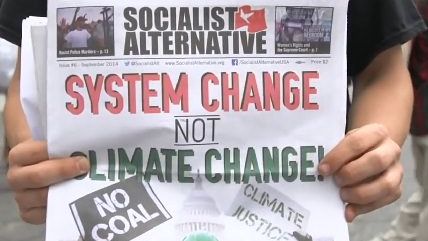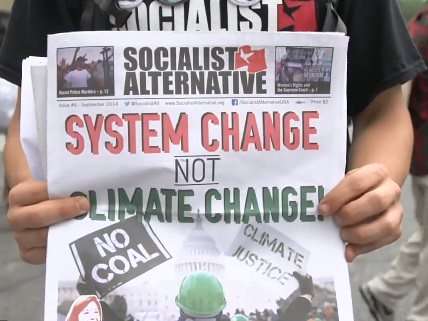Capitalism and Climate Change
The problem today is not that capitalism can't function without ruining the environment, but that the public isn't demanding serious action against global warming.


For some of the people in New York this week demanding action on global warming, the menace is not just carbon dioxide. The real Tyrannosaurus Rex is the American economic system. On Monday, the day after the huge march through Manhattan, a few hundred protesters showed up in the financial district for "Flood Wall Street." Their slogan: "Stop Capitalism. End the Climate Crisis."
One of them lamented to ThinkProgress that "not many people are willing to say that the root problem of climate change is capitalism." Another told The Daily Beast she was there "because I'm a Mashpee Wampanoag native to this country, and as far as I'm concerned, Wall Street greed has been killing me and my ancestors for 400 years."
It's not exactly clear how Wall Street greed was killing Native Americans in the 17th century, since the New York Stock Exchange didn't come into being until 1817. But leave that aside. What was obvious from the Monday protest is that the radical members of the movement against climate change have some serious misperceptions about economics and the environment.
It's true that there are corporations that profit from goods and services that contribute to global warming, from Exxon Mobil to General Motors to Duke Energy. But blaming capitalists for excessive carbon dioxide in the atmosphere is like blaming grocery stores for obesity. In each case, the business is taking its cue from what consumers want.
Capitalists have no stake in pumping out greenhouse gases double time. If consumers prefer products that are easy on the Earth, business people will trample each other to provide them. When the federal government cracked down on air and water pollution in the 1970s, companies found ways to survive—and even to profit from cleaning up the environment. If Washington takes sensible steps to curb carbon dioxide output, the same thing will happen.
It's not as though socialism is a proven way to restore the Garden of Eden. The profit motive was anathema in Eastern Europe under communism. But the region became a giant chemical waste dump.
"As Eastern Europe struggles toward democracy, it must also grapple with a ravaged environment," reported The New York Times in 1990. "Corrosive soot has fouled water and soil, and in blackened industrial cities the air is laced with heavy metals and chemicals."
Some land was polluted as to be useless for growing crops. Kids in one part of Poland had five times more lead in their blood than kids in Western Europe.
In China, communism was equally destructive. American University scholar Judith Shapiro wrote a book called "Mao's War Against Nature."
The idea that capitalist businesses can't function without belching poison is one the Flood Wall Street folks share with many corporate executives and Republican politicians. When the Environmental Protection Agency ordered a 30 percent cut in emissions from coal-fired power plants, critics insisted it would kill jobs and cripple growth.
Alarmists said the same thing when Congress passed the Clean Air Act and the Clean Water Act decades ago. In fact, companies quickly adapted to the new rules—a tribute to the innovative capacity of a free-market system.
Since 1980, carbon monoxide pollution in America has been cut by 83 percent, lead by 91 percent, and sulfur dioxide by 78 percent. But total output per person, adjusted for inflation, has risen by 77 percent. We've gotten greener and healthier as we've gotten richer.
Today's corporations, subjected to meaningful limits on carbon output, would soon find low-cost ways to comply. That's why a lot of impeccably conservative economists have endorsed a carbon tax—including Greg Mankiw, who was George W. Bush's chief economic adviser, and the late Nobel laureate Gary Becker, who said it "would be appropriate in light of the real threat from global warming."
The problem today is not that capitalism can't function without ruining the environment, but that the public isn't demanding serious action against global warming. A recent Gallup poll found most Americans think the planet is baking—but they rank the issue 14th in importance on a list of 15 concerns.
Back in 1990, a Polish teenager, asked about environmental degradation in his country, told The New York Times, "I don't know the way, but we have to get over the I-don't-care disease." Capitalism can't cure that malady. But if and when we overcome it, capitalism can reverse its effects.


Show Comments (148)